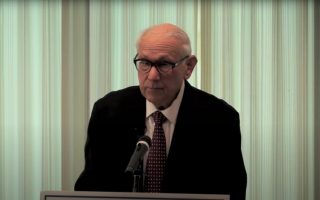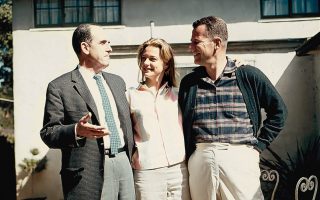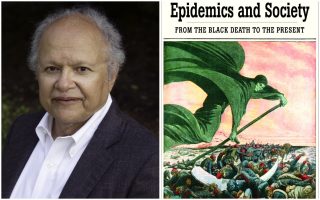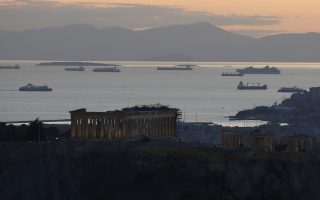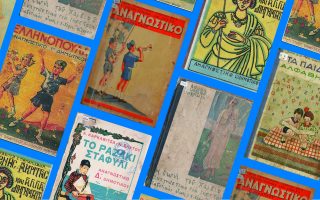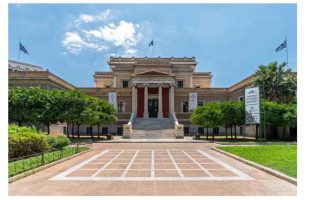‘Contact with Greece made me a better person’
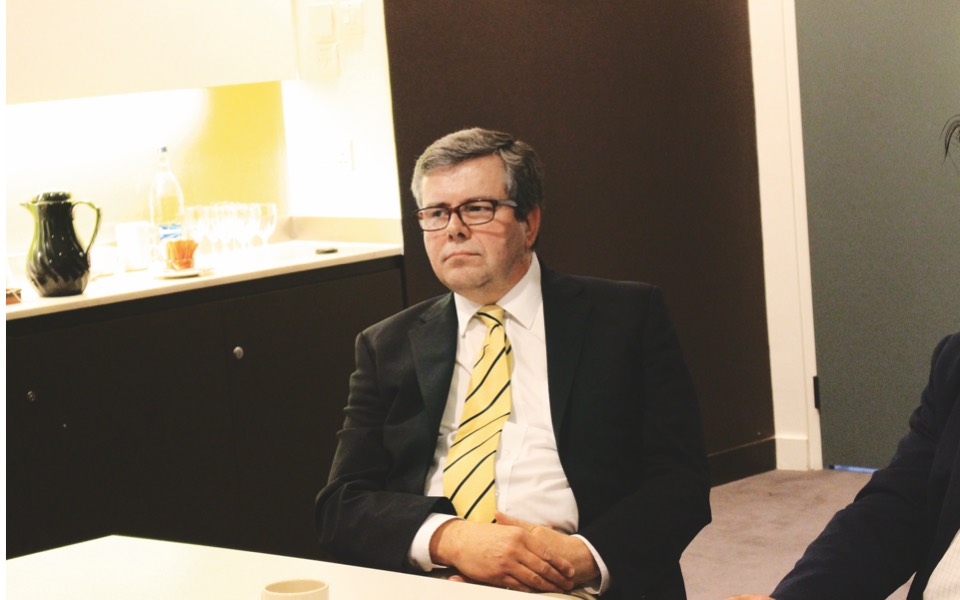
How does a modern-day Philhellene see Greece today? Kevin Featherstone, a professor of European studies, the Eleftherios Venizelos Chair in Contemporary Greek Studies, and director of the Hellenic Observatory at the London School of Economics, has a relationship with Greece that spans five decades, starting when he was a student.
His contribution has been enormous, and Kathimerini spoke with him via Skype – in keeping with the new norms – on the occasion of the 25th anniversary of the Hellenic Observatory.
His observations shed a different light not just on our understanding of how we’re viewed by others, but also on how we view ourselves.
You have just marked the 25th anniversary of the London School of Economics’ Hellenic Observatory. What is the Hellenic Observatory’s main function in the framework of the LSE?
We are a bridge between Greece and the UK, a bridge which is probably more necessary after Brexit than before. We contribute to limiting the misunderstanding between the two countries. I also think we are the most prominent international center for the study of contemporary Greece in the social sciences. The LSE platform allows us to have a very international profile. So when we have events like on Zoom or Skype, we have people joining from China, Bangladesh, Mexico. Did you know that there are many diaspora Greeks in Bangladesh? Every year we have more than 60,000 visitors for the Hellenic Observatory website.
How did you first get to know about Greek affairs?
I was a first-year student at university at the time of the Polytechnic protests (November 1973). There were many Greek students around me. It was a lively conversation, certainly in radical circles.
Were you a radical, too?
Oh yes. Bear in mind that at that time political science students were reading Nikos Poulantzas’ books. The attraction to Greece was focused on what was happening in the 1970s. I’ve never studied Classics or ancient Greece.
How did you approach the Turkish invasion in Cyprus that led to the collapse of the Greek junta?
At the Hellenic Observatory we recently had the presentation of Alexis Papachelas’ new book “The Dark Room.” I could see the Henry Kissinger role in the whole affair. He can be rightly criticized for his lack of foresight and his short-termism. He had not seen the consequences of what he was pursuing. Alexis describes him as cynical, and I can see why. But Kissinger’s worldview was one of a realist. Foreign policy for him was about power.
Do you suspect that Kissinger’s main concern was to remove Makarios in order to negate any Russian influence on the island and after that he didn’t really care about the fate of the island or the balance between the Greek and Turkish sides?
Absolutely. Washington and London saw Makarios as a loose cannon. From this point of view getting rid of him was not a disadvantage. Definitely, that’s how it was seen if you sat in the State Department.
What was next in your Greek experience after the turbulent period of the restoration of democracy?
I came for holidays and I loved the country. Then I was genuinely fascinated by the (slogan) “Change” and Andreas Papandreou of 1981.
How did you come to be fascinated by Andreas Papandreou?
One of the first people I met with in Greece was Lady Amelia Fleming. She admired Andreas. I never heard such eulogy about a human being. This made me even more fascinated. I was wondering: Can this be real? Remember the Syntagma Square public speeches and the helicopters hovering around with their television cameras. That was politics as mass theater. Why wouldn’t one be attracted?
Do you have a favorite Greek political phrase?
“Τσοβόλα δώσ’ τα όλα” (Tsovola, give it all). This is the best introduction to politics of this era. It’s the best tweet one can have. If I was talking to someone from Arizona trying to explain Greek politics, it would be a good start. I also remember being on the balcony at the Hotel Grande Bretagne waiting for Andreas’ speech at Syntagma Square in June 1989. Suddenly, we all heard the Beatles song “Yesterday.” I was amazed by the irony.
Why?
In the song there’s the phrase “All my troubles seem so far away.” Just think that Andreas and PASOK had all these problems with the Koskotas scandal and the leader’s marriage problems and the crowd was listening to a song saying that.
Did Andreas Papandreou lead Greece to more indebtedness or to more social justice?
Your question boils down to this: Was Andreas responsible for Thomsen? It goes too far if we suggest that, as there were many prime ministers in between. But yes, his government led to a change of the system, which created a higher risk of indebtedness. However, Andreas represented a very necessary and welcome system that achieved the release of systemic pressures that were there from the 1960s. This allowed Greece to be more balanced.
Was there a period in the last 10 years that you were really worried about Greece?
In June 2015, in the week before the referendum. I was very worried alongside millions of others. The risks being taken were enormous. I disliked the referendum in a sense that it was too quick and based on an absurd question. And then the result was not really respected.
Many Greeks used to think that Alexis Tsipras was something like a political successor to Andreas. Do you share that sentiment?
I think there is a similarity in terms of style between the early Andreas and Alexis Tsipras. But beneath the surface, I think there are genuinely many differences in terms of management of the party and the government. Also, Andreas was a major intellectual figure with considerable success in North America.
Does Tsipras have a political future?
In the short term, I shouldn’t be too optimistic. But he has a political future for several reasons. First, he has an attractive personality, and second, even popular governments lose support eventually. So would I expect him to be prime minister again? Yes, in eight to 10 years.
That means that Mitsotakis has a political future too.
I think a political scientist should settle for predicting the past. But yes, Mitsotakis comes across internationally very well. He represents modernization and stability. He is clearly a very able prime minister.
Let’s move to the big picture regarding modern Europe. Is Brexit an isolated incident or an omen of things to come?
If you look at the public opinion, support for EU membership has increased across the EU. The populists in the continent are weaker because of Brexit. Also, there’s been a paradigm shift in the EU. You have this huge fund and give billions to several countries around Europe. So, who would wish to miss the party when exactly all these benefits are being given out? On the other hand, the existential issue for the European Union is what is happening in Poland and Hungary. You can’t have a European Union which is not based on the clear set of values such as the rule of law and judicial independence.
How about the foreign policy framework implemented in the EU’s relations with Turkey? Does it lack a clear set of values?
There must be clear principles of recognizing what the infringement of human rights in Turkey looks like. We should be clear and tough with Ankara that the EU is based on sets of principles and values, and there can be ultimately no compromise on those. Who the hell thinks that Turkey is a safe place for ethnic minorities? Who believes that sending the refugees back to Turkey equals sending them back to some kind of welcoming civilized culture? The European Union can’t be the dirty political actor dealing with grubby side deals; Europe has to stand for values, or it is nothing.
Life-enhancing lessons
Professor Featherstone sipped English breakfast tea and I had a hot sage drink that is ideal in combating winter blues as we spoke over Skype. I asked him what his favorite Greek food was. “I would still say mousaka. But I do like the Greek cuisine tremendously.”
He has traveled all across Greece but he believes that the Peloponnese and Evia stand out. “I have been inspired by the variety of landscapes of the Peloponnese. There are many aspects that I admire about Greek culture. There’s the importance of interpersonal trust, openness and a sense of obligation. There’s this sense of the importance of the person, which I think I’ve learnt over time and I found it to be a very life-enhancing. I think I’ve learned something from my contact with Greece which has made me a better person.”
